Toward Evidence-Based Antiracist Policymaking: Problems and Proposals for Better Racial Data Collection and Reporting (June 2022)
The study of data concerning racial and ethnic inequities and disparities allows us to better understand experiences of racism, and to see more clearly how and where racism manifests. Studying the effects of racism, in turn, allows us to more easily identify racist policies, so that we can craft antiracist interventions.
Existing race and ethnicity data collection efforts are riddled with gaps and errors, including missing and incomplete data, insufficiently disaggregated data, lack of meaningful longitudinal data, infrequently updated data, non-standardized methodologies, and other problems. These deficiencies significantly hinder evidence-based antiracist policymaking.
This policy report examines the state of racial and ethnic demographic data collection and reporting in the U.S., and offers policy recommendations to improve such systems. In particular, this report demonstrates the need for a standardized and nation-wide system of racial data collection and reporting.
This report is based on the experiences of two teams of researchers that collected racial and ethnic data between March 2020 and August 2021: The COVID Racial Data Tracker (CRDT) and the Racial Data Tracker (RDT). The CRDT, a collaboration between The Atlantic’s COVID Tracking Project and the BU Center for Antiracist Research (the Center), was the first public database containing racial demographic data about COVID-19 cases, hospitalizations, and deaths across the U.S. The RDT, a Center initiative, collects racial and ethnic data in several other policy areas, including houselessness, criminal arrests, and police violence. The CRDT and RDT teams’ experiences, described in this Report, demonstrate the current challenges of obtaining racial and ethnic data across different jurisdictions, levels of government, and policy areas, and offer critical insight as to how to reform racial and ethnic data collection and reporting practices in the U.S.
Download PDF of full policy report
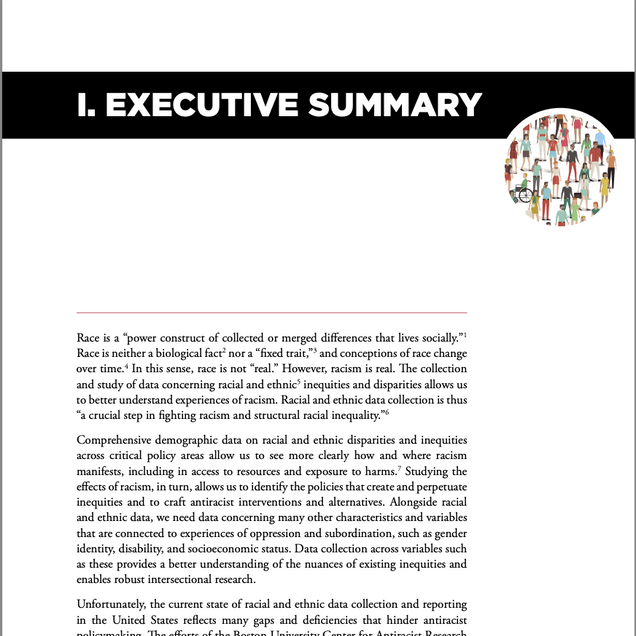
1. Executive Summary
Race is a “power construct of collected or merged differences that lives socially.” Race is neither a biological fact nor a “fixed trait,” and conceptions of race change over time. In this sense, race is not “real.” However, racism is real. The collection and study of data concerning racial and ethnic inequities and disparities allows us to better understand experiences of racism. Racial and ethnic data collection is thus “a crucial step in fighting racism and structural racial inequality.” More
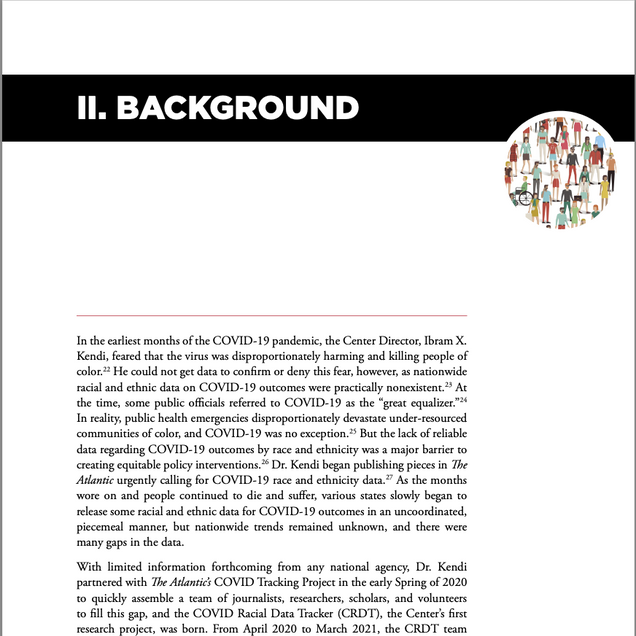
2. Background
In the earliest months of the COVID-19 pandemic, the Center Director, Ibram X. Kendi, feared that the virus was disproportionately harming and killing people of color. He could not get data to confirm or deny this fear, however, as nationwide racial and ethnic data on COVID-19 outcomes were practically nonexistent. At the time, some public officials referred to COVID-19 as the “great equalizer.” In reality, public health emergencies disproportionately devastate under-resourced communities of color, and COVID-19 was no exception. More
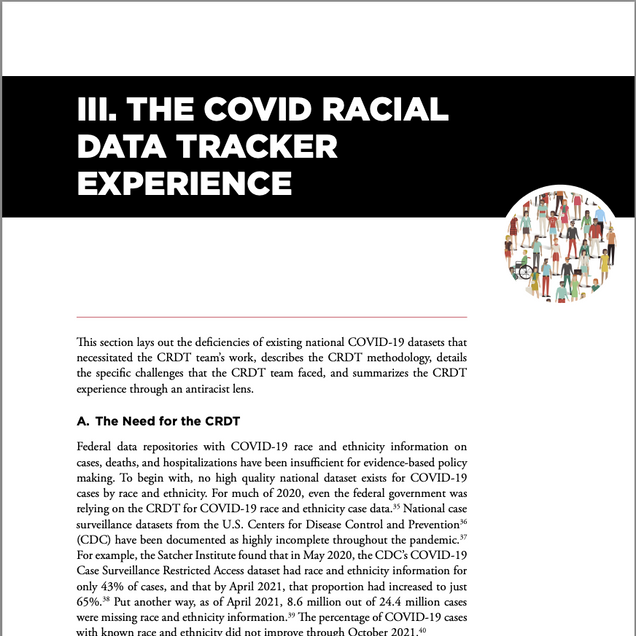
3. The COVID Racial Data Tracker Experience
This section lays out the deficiencies of existing national COVID-19 datasets that necessitated the CRDT team’s work, describes the CRDT methodology, details the specific challenges that the CRDT team faced, and summarizes the CRDT experience through an antiracist lens. More

4. The Racial Data Tracker Experience
In this section, we describe the experience of the RDT team collecting data in the summer of 2021. We describe the RDT methodology, detail the challenges and data deficiencies the RDT team encountered for each issue area it studied, and summarize the implications for antiracist policymaking. More
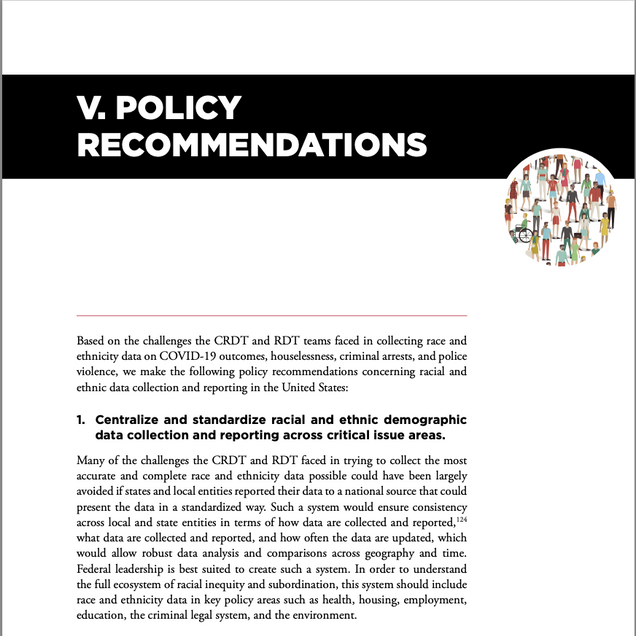
5. Policy Recommendations
Based on the challenges the CRDT and RDT teams faced in collecting race and ethnicity data on COVID-19 outcomes, houselessness, criminal arrests, and police violence, we make the following policy recommendations concerning racial and ethnic data collection and reporting in the United States More
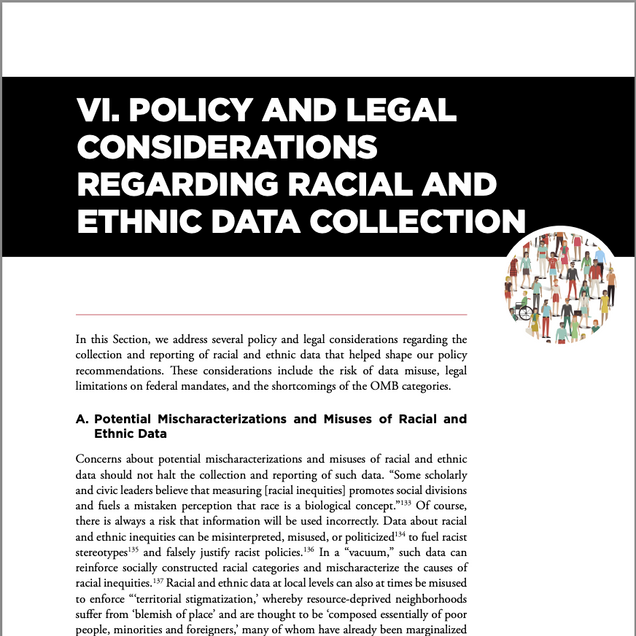
6. Policy and Legal Considerations Regarding Racial and Ethnic Data Collection
In this section, we address several policy and legal considerations regarding the collection and reporting of racial and ethnic data that helped shape our policy recommendations. These considerations include the risk of data misuse, legal limitations on federal mandates, and the shortcomings of the OMB categories. More
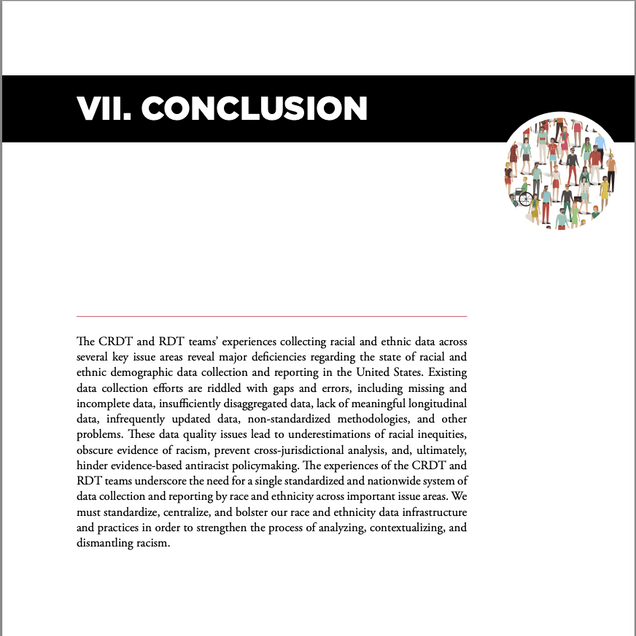
7. Conclusion
The CRDT and RDT teams’ experiences collecting racial and ethnic data across several key issue areas reveal major deficiencies regarding the state of racial and ethnic demographic data collection and reporting in the United States. Existing data collection efforts are riddled with gaps and errors, including missing and incomplete data, insufficiently disaggregated data, lack of meaningful longitudinal data, infrequently updated data, non-standardized methodologies, and other problems. These data quality issues lead to underestimations of racial inequities, obscure evidence of racism, prevent cross-jurisdictional analysis, and, ultimately, hinder evidence-based antiracist policymaking. More